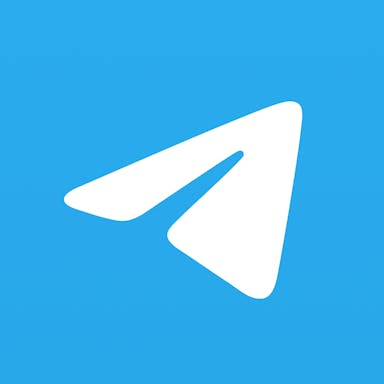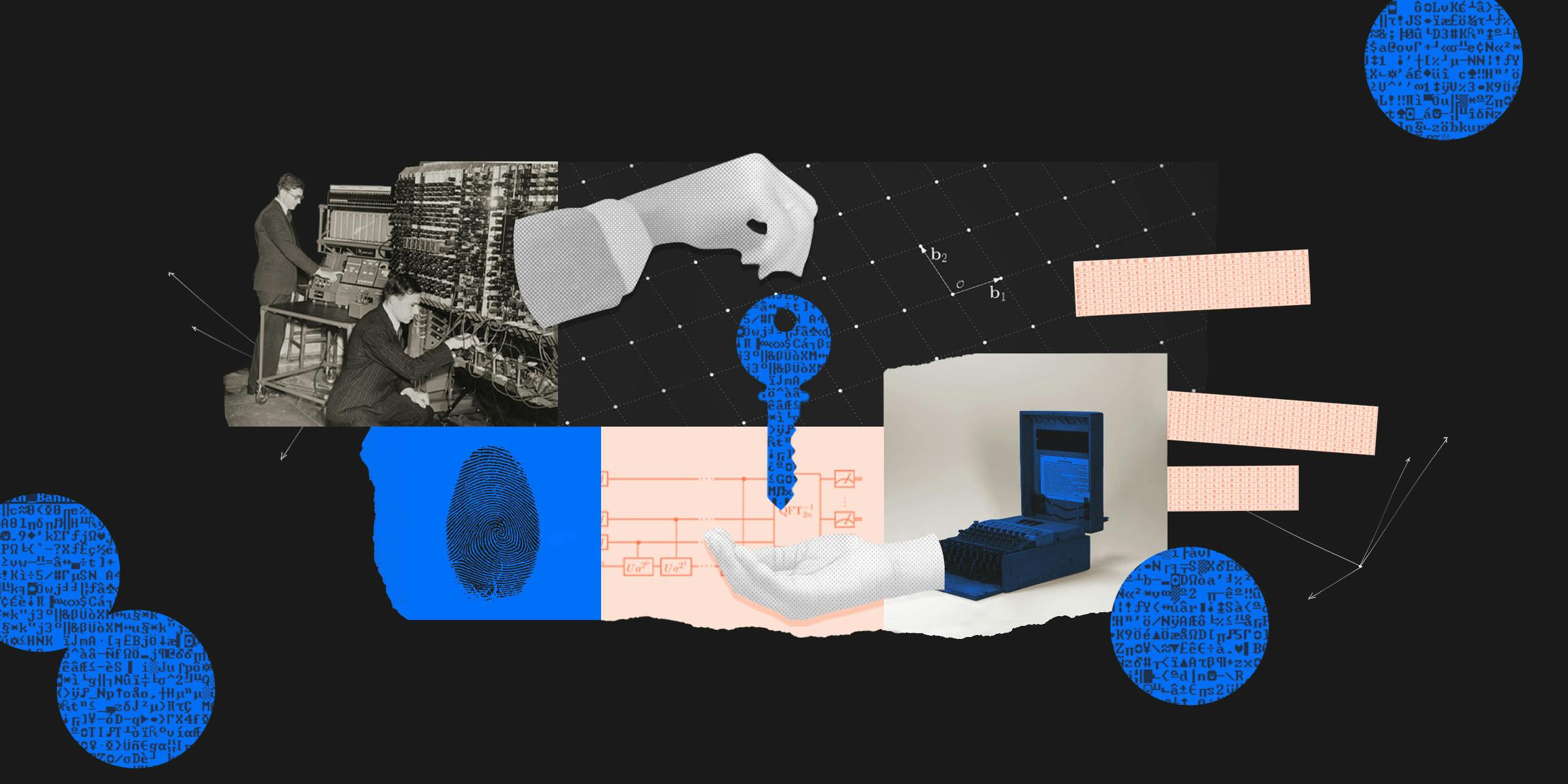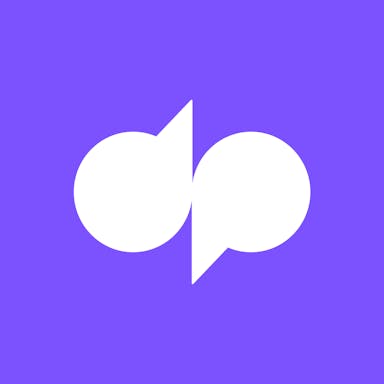Thesis
The global messaging app market is large and expanding rapidly, with growth from 2.1 billion active users in 2016 to 3.4 billion as of January 2025 driven by a number of factors. One driver is the increase in smartphone penetration; 91% of Americans owned a smartphone by March 2025, up from just 35% in 2011. The same pattern has emerged internationally; In October 2023, it was reported that 54% of people around the world, or 4.5 billion people, owned a smartphone. Wider mobile internet access has also fuelled this growth, with milestones such as the rollout of 5G in 2019 expanding global connectivity.
As messaging app usage has become increasingly ubiquitous, user concern over data privacy and security has grown as well. For example, a May 2023 survey found that 71% of American adults were growing more concerned about how data collected on them is being used by the government. In 2025, 76% of Americans expressed distrust towards social media companies, fearing misuse of personal data. This growing distrust has amplified the demand for secure messaging platforms that prioritize user privacy.
Telegram is a messaging app that focuses on “speed and security” and describes itself as “like SMS and email combined”. Telegram’s product is a cloud-based messaging platform that allows users to share messages, photos, videos, and files, with conversations synced across all of a user's devices at the same time. Users can create groups of up to 200K people in size. Telegram also offers privacy features such as end-to-end encrypted device-specific secret chats, as well as end-to-end encryption for voice or video calls. Group or private chats not employing the “secret chat” feature are not end-to-end encrypted, but instead protected by what Telegram describes as server-client encryption.
Founding Story
Pavel Durov (CEO) and his brother Nikolai Durov (Director of Engineering) founded Telegram in August 2013. Prior to Telegram, Pavel founded VKontakte (VK) in 2006, a Russian social media platform similar to Facebook, after graduating from St. Petersburg State University. His success with VK earned him the nickname “the Russian Mark Zuckerberg,” but it also made him a target of the Kremlin.
In December 2011, Pavel refused a request from the federal security service to shut down groups on VK that were organizing protests against parliamentary election results. Despite the growing scrutiny of VK, Pavel and his brother Nikolai began working on a side project called Telegram in 2013, while Pavel was still serving as the CEO of VK. They developed Telegram as an encrypted messaging system to communicate without the Russian security services intercepting their messages, releasing it in August 2013 without a formal announcement.
Tension between the Kremlin and Pavel escalated in April 2014 following the outbreak of the war between Russia and Ukraine. Pavel once again refused government orders to hand over the personal data of Ukrainian opposition leaders from their VK accounts. As a result, he was fired from his position as the CEO of VK that same month. Shortly after his dismissal, Pavel left Russia. In December 2014, under pressure, he sold his remaining 12% stake in VK to a business partner of Alisher Usmanov, a billionaire with close ties to Putin who held a controlling stake in Mail.ru. This sale resulted in Mail.ru owning 100% of VK.
After leaving Russia in 2014, Pavel and his team of 15 engineers focused on developing Telegram, working from various locations around the world. Pavel obtained citizenship in St. Kitts, a Caribbean island, which allowed him visa-free travel throughout Europe. Initially, Telegram was based out of a small office in Berlin, but the team later adopted a nomadic lifestyle, working all around the world. Pavel stated that this approach was intended to prevent the company from becoming entangled in the politics or economic challenges of any one nation.
Nikolai Durov was responsible for the creation of the MTProto protocol, the foundation upon which Telegram operates, while Pavel provided the financial backing and strategic direction. With a reported $300 million from the sale of his VK shares, Pavel was able to establish the infrastructure necessary for Telegram's operations and growth. As of April 2025, Pavel was the 118th richest person in the world, with a net worth of $17.1 billion.
The company has maintained a small headcount despite its growth. In March 2025, it was reported that despite having a user base of one billion, Telegram employed only about 30 full-time employees. Pavel Durov stated in a June 2024 interview that he remained the only product manager at the company.
In August 2024, Pavel Durov was arrested in France after landing at Le Bourget airport outside of Paris, where he was held for questioning pending charges. French authorities stated that his arrest was in connection with an investigation into illegal activities on Telegram, including alleged drug trafficking, child pornography, money laundering, and fraud. France’s child protection agency, OFMIN, had issued the arrest warrant. Although Durov was not implicated in these crimes, he may have been detained due to Europe’s Digital Service Act (DSA), which makes companies liable for content hosted on their platforms.
At the time of Durov’s arrest, Telegram made a statement via Twitter that Pavel Durov had “nothing to hide and travels frequently in Europe”, that “Telegram abides by EU laws, including the Digital Services Act”, and that it was “absurd to claim that a platform or its owner are [sic] responsible for abuse of that platform.”
On August 23, 2024, Durov was released from French custody after the 96-hour period he could be held for questioning had elapsed. However, he was formally indicted by French prosecutors on charges of complicity “in the distribution of child sex abuse images, aiding organized crime and refusing lawful orders to give information to law enforcement.”
After being questioned by a judge, Durov posted a €5 million bail and was prohibited from leaving France, where he has to check in with authorities twice a week. As of September 2025, it may be a long time until he is brought to trial, if any occurs, due to the nature of the French judiciary, which conducts an investigation before bringing a case to trial and is ”notoriously slow to process cases” as a result.
During Durov’s arrest and indictment, The Wall Street Journal reported that he had been targeted in a 2017 spy operation. French intelligence agencies, in cooperation with the UAE, reportedly hacked his iPhone in a joint operation code-named “Purple Music,” allegedly due to concerns over Telegram’s use by pro-democracy activists, dissidents, and claims that the app attracted extremists, drug traffickers, and cybercriminals. Despite this, Durov received Emirati citizenship in 2021, the same year the UAE invested over $75 million in Telegram. In March 2025, French authorities allowed Durov to temporarily return to Dubai, where Telegram is based. As of September 2025, the investigation remains active.
In June 2025, during his first extended public appearance since his detention, Durov gave a broad interview to Le Point, defending Telegram’s moderation policies, accusing certain states of political pressure, and claiming the charges against him were politically motivated. Reflecting on the personal toll of his travel ban, he said:
“My parents have very serious health problems, and, statistically, they only have a few years left to live. I've been deprived of precious months with them. Also, I have a son who was just born and I'm missing the first months of his life. He still doesn't have a passport, because I wasn't present at his birth in Dubai. I also have a teenage son who is in a boarding school in Dubai, who just broke his arm, and who has no parent by his side to support him. They say Telegram refused to cooperate. That's false.”
Durov reaffirmed that privacy and freedom of expression remain Telegram’s core principles. He stated the company will never be sold, citing rejection of a $1 billion offer from Google, and emphasized that he retains full ownership of the company to preserve independence. In the event of his death, control of Telegram will pass to a nonprofit foundation. In the same interview, he clarified that Telegram does not generate personal income for him; his wealth derives from early Bitcoin investments. Pavel also revealed that his will distributes his fortune, estimated to be between $13.9 billion and $17 billion, equally among all 106 children he says he has fathered, intentionally delaying their access to the inheritance for 30 years to encourage independence and avoid conflict.
In a post on X, Pavel said the messaging app was “committed to turn moderation on Telegram from an area of criticism into one of praise”. Since then, the company has implemented changes, including joining the Internet Watch Foundation, sharing user IP addresses and phone numbers with law enforcement upon legal request, and publishing regular transparency reports, a practice Telegram had resisted before. A Telegram spokesperson said the company actively removes millions of pieces of harmful content each day, adding that “unfortunately, criminal activity exists on every platform, despite efforts to combat it.”
In February 2025, Australia’s eSafety Commissioner fined Telegram nearly $1 million for failing to report measures addressing extremist content and child exploitation; the company plans to appeal.
As of August 2025, Pavel remains Telegram’s CEO and sole owner. Nikolai Durov remains the platform’s technical lead, publicly associated with advanced AI projects and developments related to The Open Network (TON), a blockchain ecosystem launched by Telegram.
Product
Telegram offers a suite of products designed to support comprehensive digital communication. Its platform includes:
Cloud-based instant messaging
TON, a layer-1 blockchain protocol that supports in-app cryptocurrency transactions and a native crypto wallet, as well as web3 app integration
Channels with ad-revenue sharing
Interactive bots
A standalone anonymous blogging platform
A mini-app platform for web-based applications
Telegram Passport for secure identity verification
Telegram Business for automating customer interactions
Telegram Stars as an in-app currency for transactions
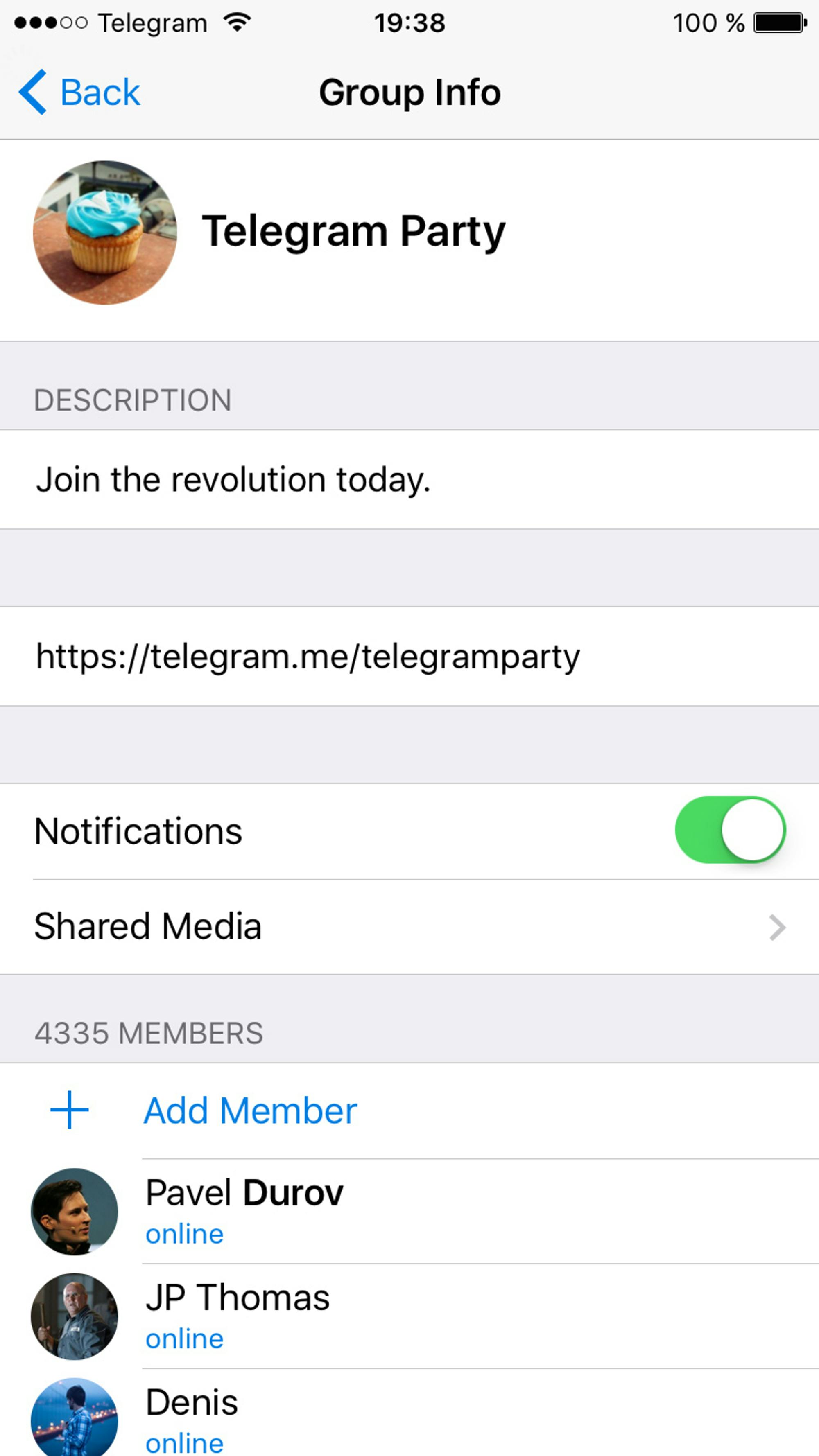
Source: Telegram
Telegram's core offering is its cloud-based instant messaging service, available across both mobile and desktop devices. Users can send messages, stickers, photos, videos, and files of any type, create groups with up to 200K members, or set up Telegram channels to broadcast to an audience of unlimited size.
Telegram also offers secret chats, which use end-to-end encryption, intended to ensure complete privacy. Secret chats self-destruct after a specified time. When a secret chat is created, encryption keys are exchanged between devices using the Diffie-Hellman key exchange, with a visual representation of the key generated for verification to ensure the chat's security against unauthorized access.
Conversely, regular cloud chats and groups use client-server/server-client encryption, preventing ISPs and third parties from accessing the data, although Telegram servers can. Additionally, Telegram is designed to be lightweight. It requires minimal storage space, taking up less than 100 MB, with media generated by user chats stored in the cloud.
In order to make it easier for individuals and businesses to join a group of chats and channels, Telegram also supports shareable chat folders with up to 200 chats, which can be customized by users and shared with contacts or followers via a link. According to Telegram, this feature is intended to provide “a seamless onboarding process for companies, enables journalists and experts to rapidly share lists of curated news sources and communities, and more.”
Stories
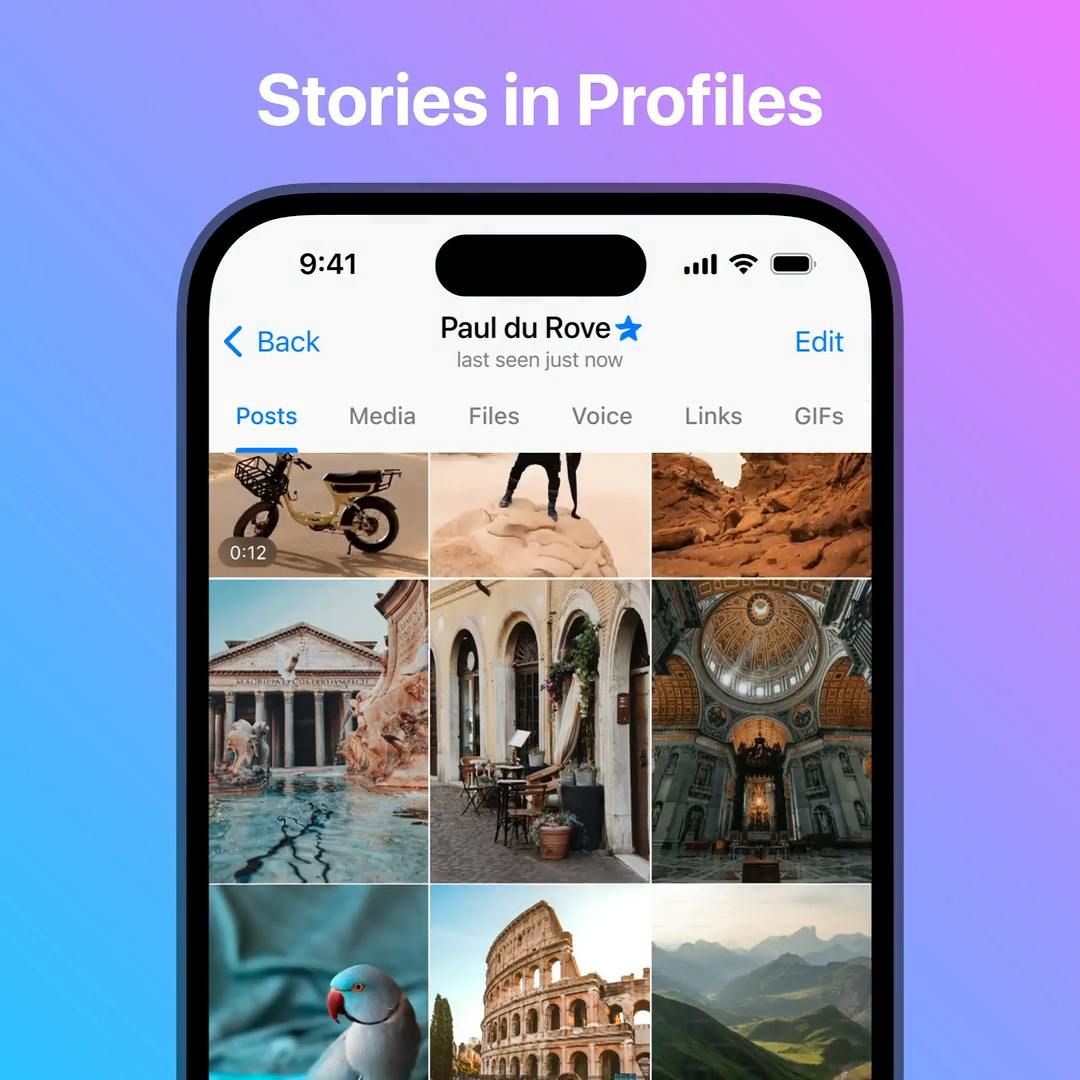
Source: Telegram
In addition to its instant messaging platform for individual and group chats, Telegram also offers social media features such as its Telegram story offering, which launched in August 2023 and allows users to share pictures and videos with their Telegram contacts, similar to Snapchat stories.
Telegram Stories allows for dual camera mode, in order to allow users “to capture a moment from every angle using both the front and rear cameras of your device simultaneously”, a format pioneered by BeReal. It also provides different expiration options (stories can be set to last for six, 12, 24, or 48 hours) and privacy options to control which contacts can see stories and how long, in keeping with Telegram’s privacy-focused value proposition.
The Open Network (TON)
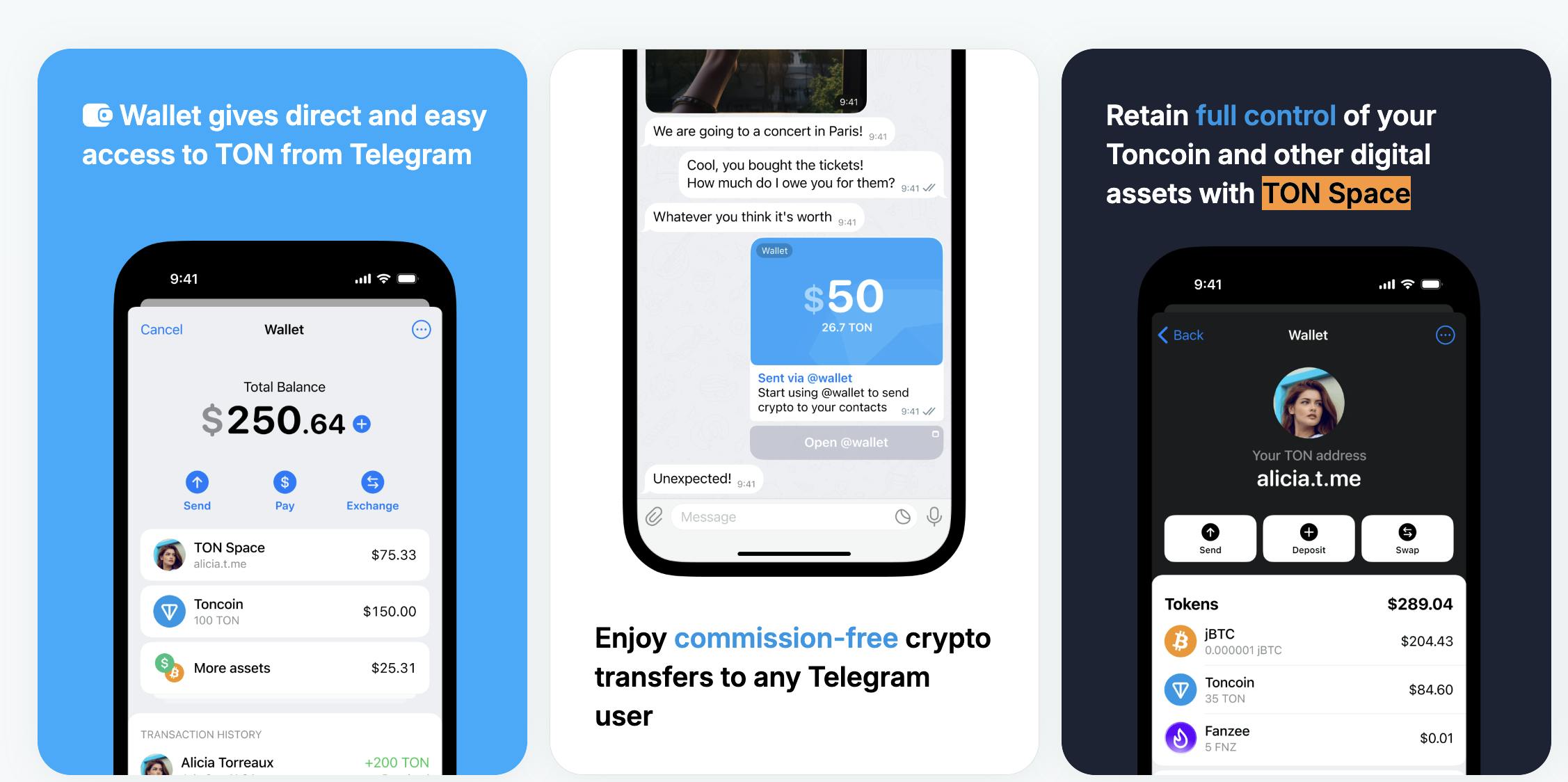
Source: TON
The Open Network (TON) is a decentralized platform comprising the TON Blockchain, TON DNS, TON Storage, and TON Sites. Initially developed by Telegram in 2018, TON aimed to be its own blockchain with its own cryptocurrency (Gram), raising $1.7 billion before halting due to SEC charges in 2020, in which it was ordered to return $1.2 billion to investors and pay an $18.5 million settlement to the SEC and halt its development. It was then released as an open-source project, which was developed by independent developers.
In 2023, the TON Foundation, a non-profit, was established in Switzerland to support TON. In September 2023, Telegram endorsed TON as its official Web3 infrastructure. TON's native token, Toncoin, powers various Telegram features, such as the purchase of unique usernames on the Fragment marketplace and incentives for developers creating mini-apps and bots.
TON's integration with Telegram includes TON Space, a self-custodial crypto wallet with over 6 million monthly users, and the ability to send Tether tokens within the app. While the wallet was developed by The Open Platform, not Telegram itself, it allows Telegram users to securely store, send, and receive cryptocurrency tokens. Although it is excluded from use in certain regions like the US due to regulatory issues, TON Space is intended to position Telegram as a gateway to the crypto ecosystem.
In July 2025, Telegram expanded access to its crypto wallet for its 87 million users in the U.S., following earlier delays caused by regulatory uncertainty. Telegram reports that more than 100 million global users activated their wallets in 2024. As of September 2025, public data shows that about 378K transactions are processed on the TON blockchain per day.
Channels
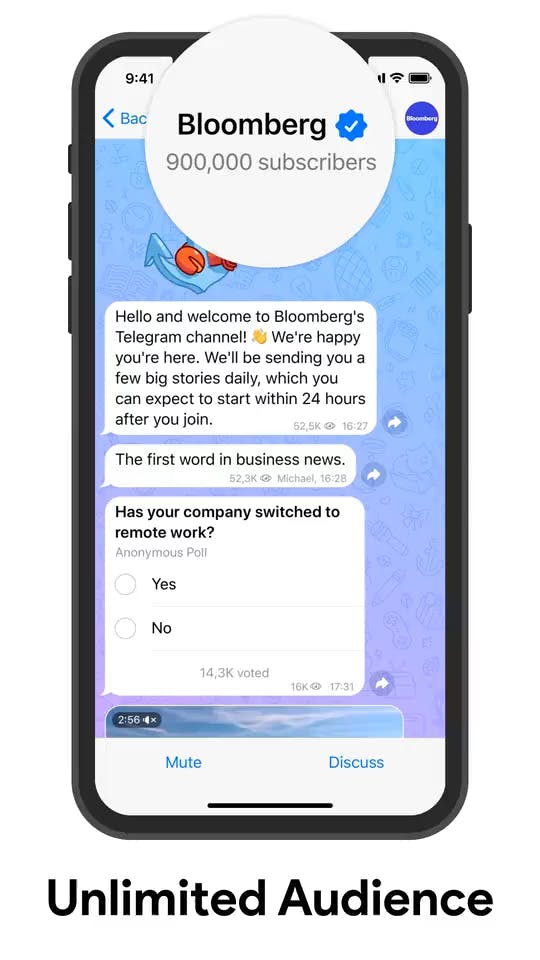
Source: Telegram
Telegram Channels are a tool for broadcasting public messages to large audiences, where only administrators can post content to subscribers. Channels are popular among content creators, bloggers, and businesses for sharing text, images, videos, and other media. In 2023, 85% of Telegram users followed news channels, with 62% subscribing to entertainment channels and 58% subscribing to educational channels.
In March 2024, Telegram introduced an ad-revenue sharing model for public broadcast channels with over 1K subscribers, allowing them to retain 50% of the revenue from ads in their feeds. This move significantly impacted Telegram's monetization strategy and value proposition for content creators. Prior to this, only 10% of the over 1 trillion channel views on Telegram were monetized.
This model also expands Telegram's advertising inventory, making it accessible to marketers in nearly 100 countries. For creators, the revenue split offers a new way to monetize content directly within Telegram, potentially reaching wider audiences and building sustainable income streams.
Bots
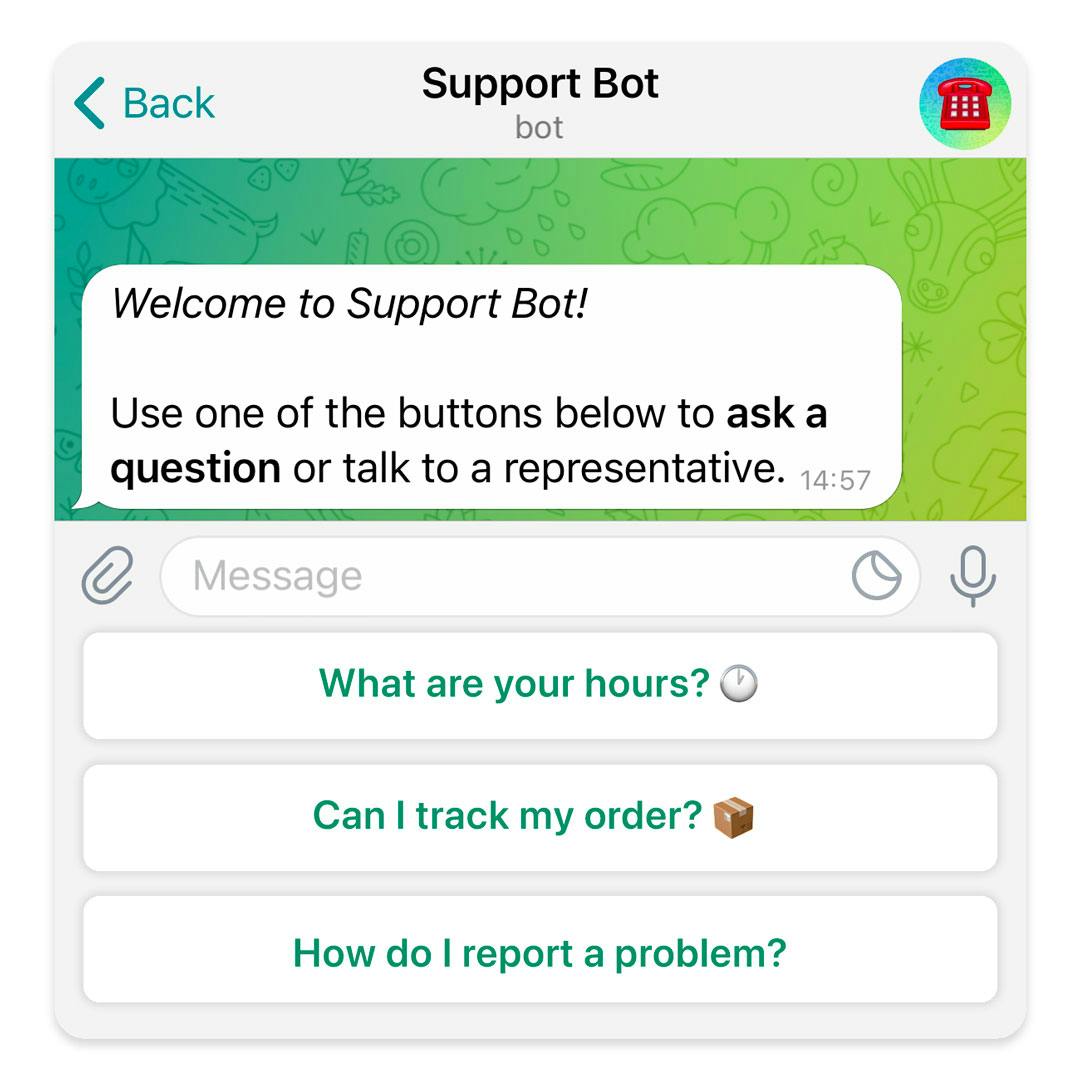
Source: Telegram
Telegram's bot platform empowers developers to build automated programs that can communicate with users seamlessly through the chat interface. These bots function as virtual chat partners, offering a wide array of services and features. They can independently perform tasks based on predefined instructions without requiring user intervention. Bots can send a variety of content, such as text, images, videos, and files, either in response to user requests or automatically.
Telegram Bots utilize a command-based interaction, in which users can trigger specific actions or request information by sending predefined commands within the chat. For instance, sending the “/help” command prompts the bot to display a list of available commands, making it easy for users to navigate and utilize the bot's functionalities.
The potential applications of Telegram Bots are numerous, from answering simple queries to facilitating complex transactions. Common uses include content delivery (news, weather, entertainment), utility functions (language translation, file conversion, reminders), and e-commerce. Merchants can create bots to showcase product catalogs, process orders, and handle customer support, transforming Telegram into a marketplace, especially in regions with less developed e-commerce infrastructure. Payment bots securely handle transactions, integrating with popular payment gateways and cryptocurrencies.
Telegraph
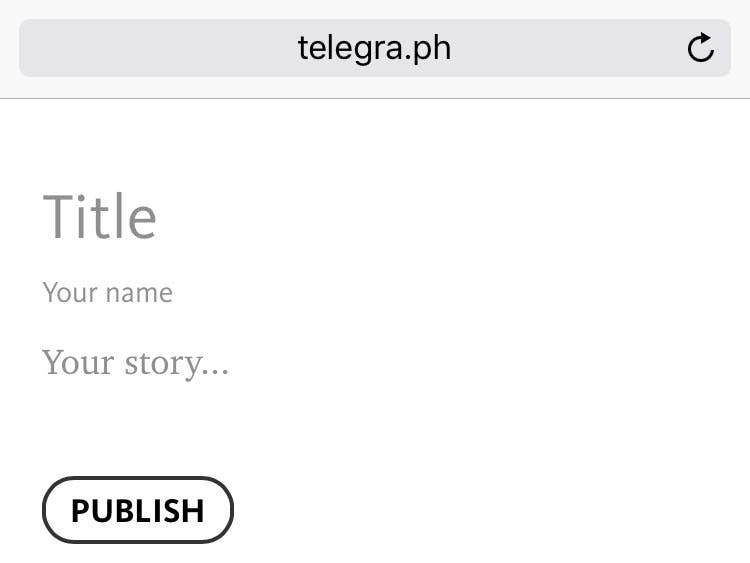
Source: Telegram
Telegraph, launched in November 2016, is Telegram’s standalone anonymous blogging platform that lets users create and publish formatted posts without an account. It supports media such as images, videos, and embedded content, making it popular for bloggers, journalists, and content creators seeking simplicity and privacy. In September 2024, Telegram disabled new media uploads to Telegraph due to misuse by anonymous actors who exploited the platform for spreading harmful or illicit content. In particular, bad actors had used the tool to carry out phishing scams by creating fake website landing pages and notices that trick users into divulging personal information. This decision by Telegram was part of broader company efforts to curb abuse and maintain platform integrity.
Mini-App Platform
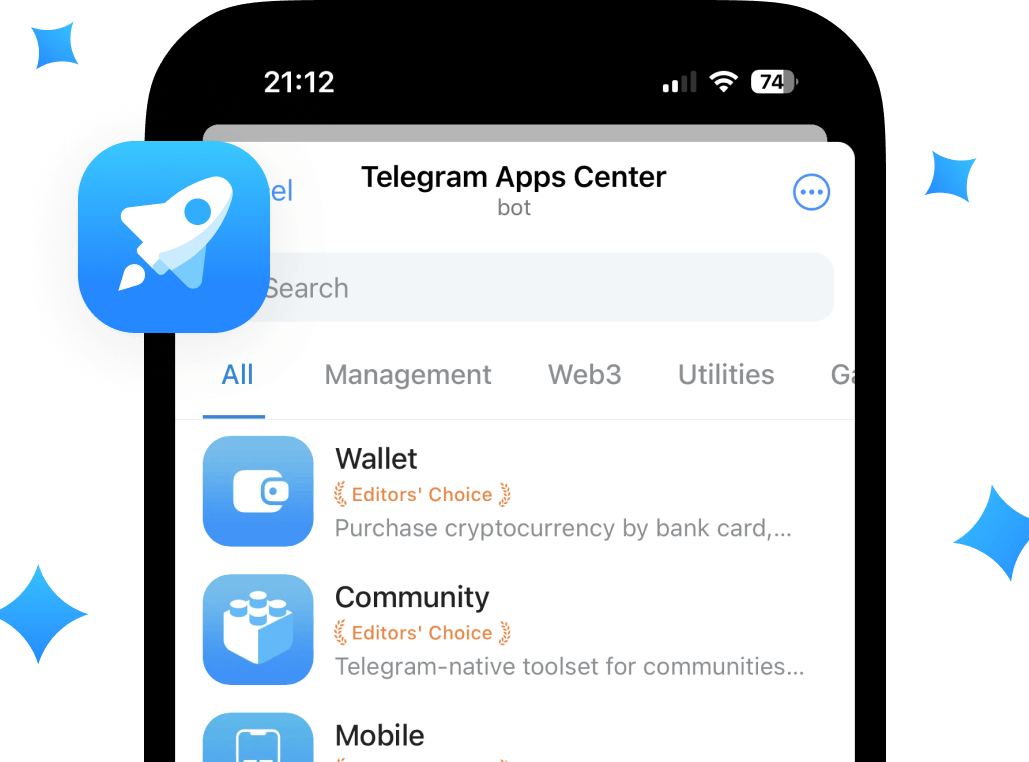
Source: TON
Telegram's Mini App platform is a tool that allows developers to create interactive experiences accessible within the chat interface. Developing Mini Apps on Telegram provides access to the platform's large monthly active user base. These apps offer various features, such as streamlined authorization, integrated payments through providers like Google Pay, Apple Pay, and cryptocurrencies, and customized push notifications.
Telegram Mini Apps collaborates with The Open Network (TON) blockchain, which offers developers a decentralized infrastructure for building and scaling their apps. TON's performance capabilities and Tencent Cloud's support for TON validators aim to ensure that Mini Apps can handle high compute intensity and network bandwidth requirements.
Telegram Passport
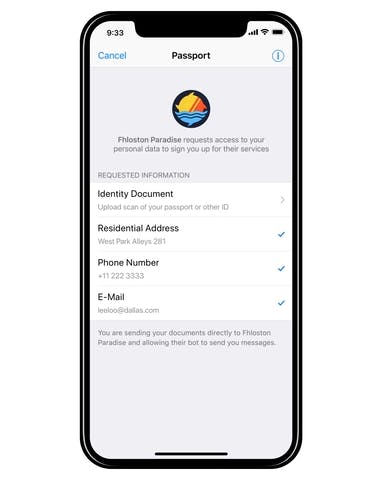
Source: Telegram
Telegram Passport is a unified authorization system for securely storing and sharing personal identification information. Users can upload identity documents (such as passports, driver's licenses, or utility bills) within Telegram, which are end-to-end encrypted and accessible only with user consent. When verifying identity with services like financial institutions or e-commerce platforms, users can share required documents directly from Telegram Passport. This feature can be used by businesses to streamline compliance with KYC and AML regulations.
Telegram Business
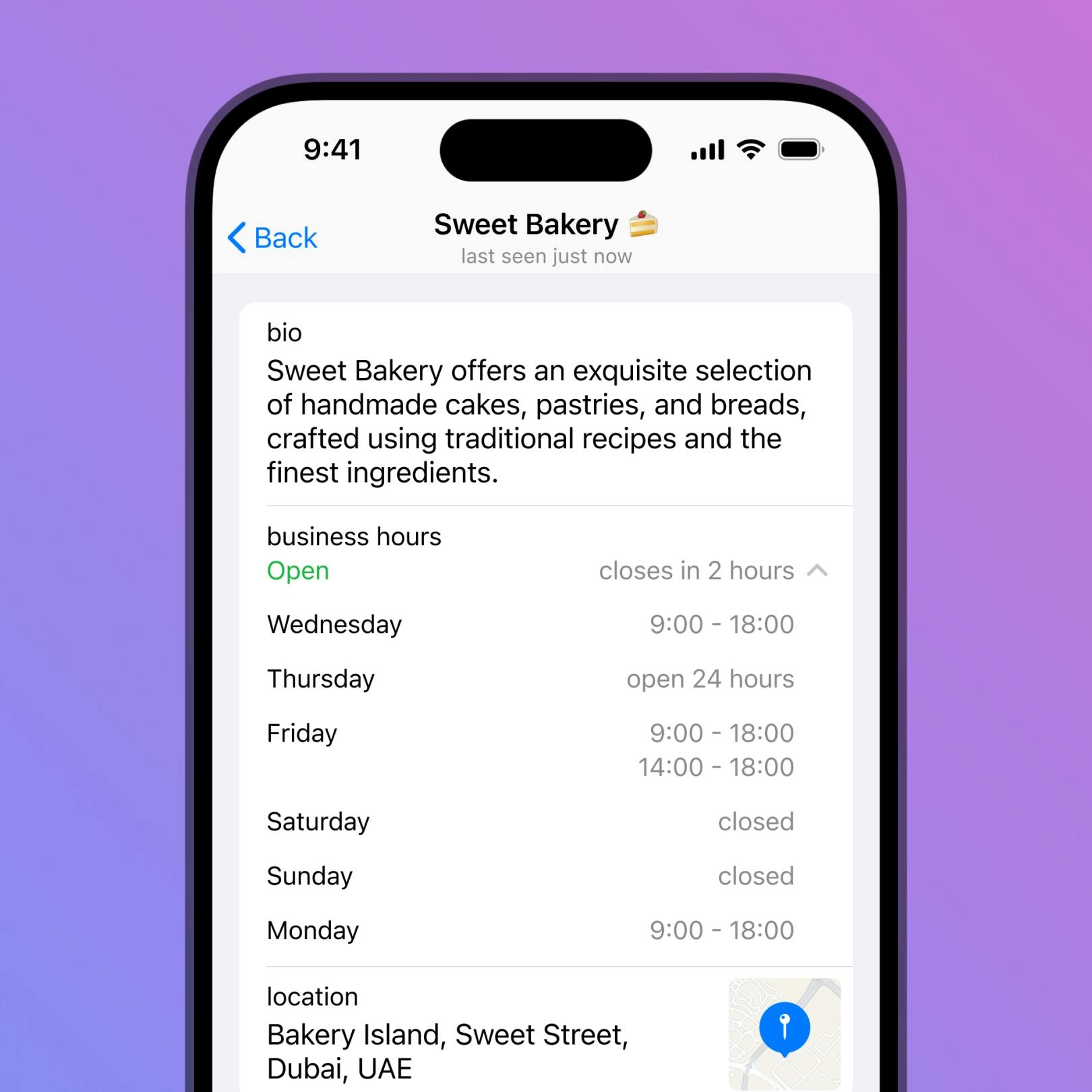
Source: Telegram
Launched in March 2024, Telegram Business offers tools for commercial users to establish a professional presence, automate customer interactions, and streamline operations. Business accounts provide verified profiles, customizable start pages, location displays, and links to relevant information. Businesses can also automate customer interactions using chatbots, handle inquiries, process orders, and offer personalized recommendations. It also features internal communication tools, such as group chats, channels, screen sharing, and voice/video calls, in order to support remote and distributed work models.
To improve platform safety, Telegram replaced its People Nearby tool in September 2024 with Businesses Nearby, a location-based service that promotes legitimate, verified local businesses. The new feature allows businesses to showcase product catalogs and accept payments directly within Telegram. The discontinued People Nearby feature had previously allowed users to find and connect with other users in their geographic vicinity. While it aimed to foster local social interactions, it was used by fewer than 0.1% of Telegram’s user base and became a target for misuse by bots and scammers exploiting location data.
Telegram has also hinted at further updates for its business platform. Pavel Durov told the Financial Times in March 2024 that upcoming features may include AI-powered chatbots to support business interactions.
Telegram Stars
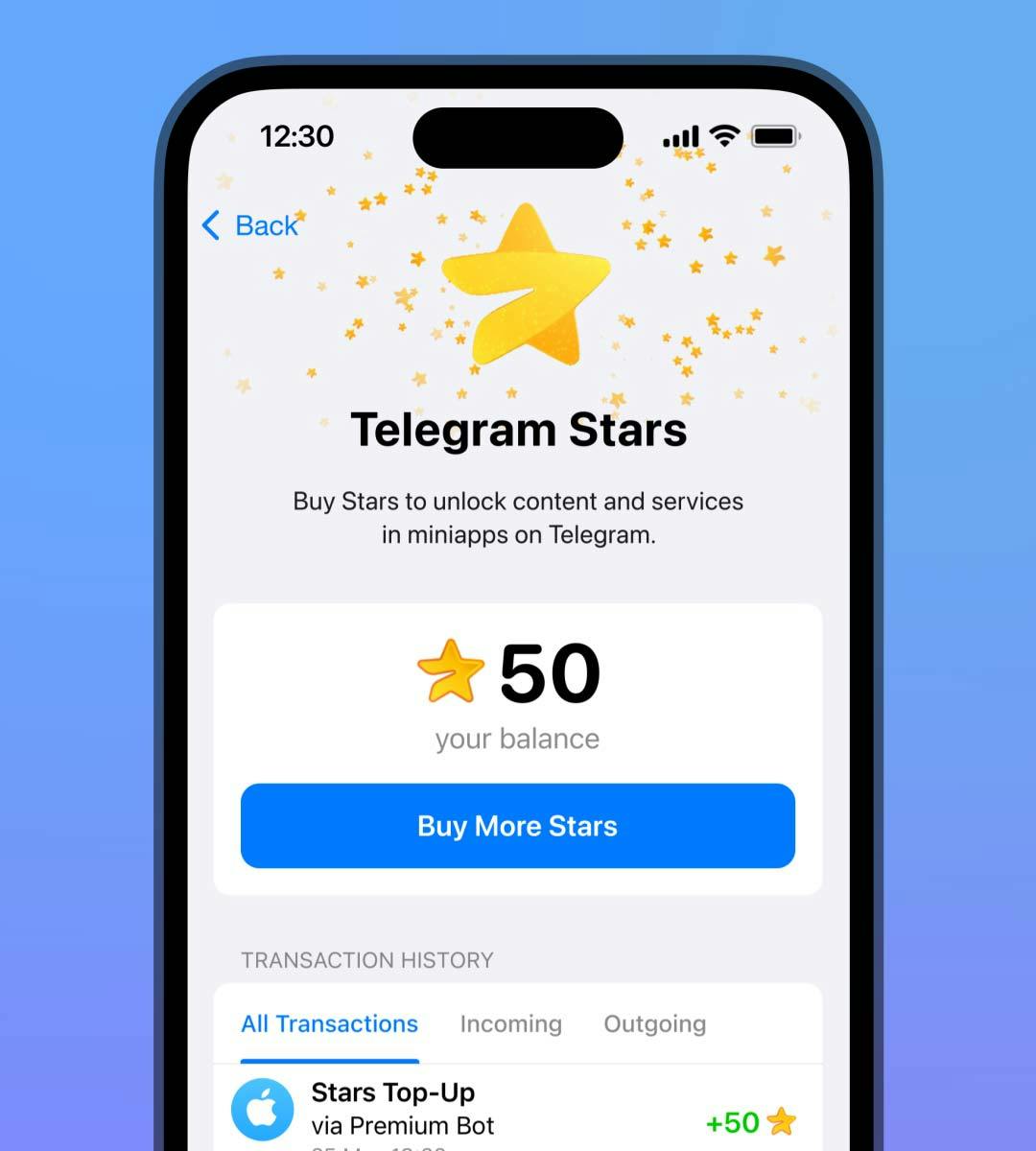
Source: Telegram
In June 2024, Telegram introduced Stars, an in-app currency for transactions within its ecosystem. Users purchase Stars with fiat currency to spend on premium content, app features, or game items. Developers and creators can monetize their work by accepting Stars, which can be exchanged for digital tokens via Toncoin.
This is intended to create a way to reward innovation and create an in-app flywheel as developers reinvest Stars in promotion. By using earned Stars to promote their apps within the Telegram ecosystem, developers can significantly decrease the effective commission they pay, in some cases to almost nothing, which, combined with the opportunity to leverage a large and expanding user base, could make releasing apps on Telegram financially attractive.
xAI Integration
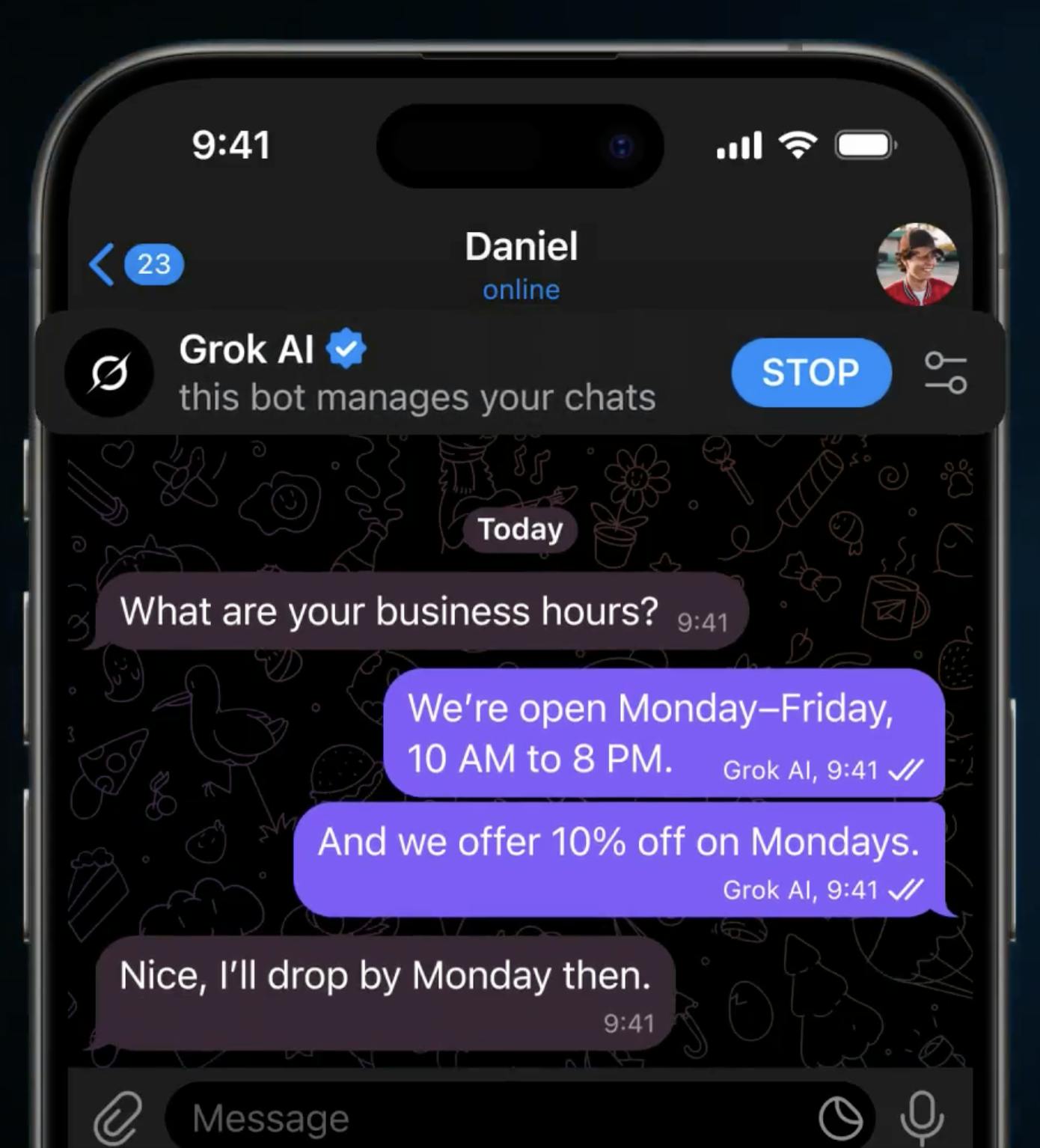
Source: X
In May 2025, Telegram and Elon Musk’s AI company xAI announced a year-long $300 million collaboration to integrate xAI’s chatbot, Grok, into Telegram. Grok’s integration would add features like instant search, business support, automated moderation, chat summaries, and writing suggestions, enhancing the user experience.
Market
Customer
Telegram's user base consists of a wide range of individuals and organizations attracted to the platform's unique features and privacy-focused approach. This includes cryptocurrency enthusiasts, privacy-conscious individuals, businesses, communities, activists, and protesters worldwide. Telegram’s largest user populations by country, as of 2023, were India (104 million users), Russia (34.4 million), Indonesia (27.2 million), the United States (26.9 million), and Brazil (21.9 million).
As of May 2025, Telegram has 450 million daily active users. On average, each user spends three hours and 45 minutes per month on the app, with sessions lasting about one minute and 21 seconds. Roughly 53% of users are between 18 and 34 years old, reflecting the platform’s appeal to younger demographics. This aligns with broader trends: Millennials and Gen Z increasingly favor privacy-focused apps, and millennials, in particular, are more likely than other generations to regularly review and adjust their privacy settings.
The platform's end-to-end encryption for secret chats and voice calls, and its ability to support large group chats with thousands of members, have made it a popular choice for those seeking secure communication and efficient coordination. Its ability to host group chats with up to 200K members has proven particularly useful for organizing events, managing remote teams, and fostering online communities.
However, these same features have also attracted more malicious actors, such as terrorist groups, sex traffickers, and child abusers. Telegram has taken steps to counter this misuse by removing such actors or restricting access to their channels. This segment of Telegram’s user base was ostensibly responsible for Pavel Durov’s arrest in France in August 2024; EU’s DSA regulation may make Telegram as a whole, and Durov personally, legally liable for illegal activities facilitated by the Telegram platform.
A concerning segment of these users on Telegram has been illicit darknet marketplaces. In May 2025, the company took decisive action against the major Chinese darknet marketplace known as Haowang Guarantee (formerly Huione Guarantee), which has been described as the “largest darknet marketplace to have ever existed.” Suspected of facilitating large-scale crypto scams, Telegram banned thousands of accounts linked to this marketplace, effectively shutting down its operations on the platform. The broader Huione Group had processed over $98 billion in cryptocurrency transactions.
Another segment of Telegram’s user base is the Russian military. Telegram was reported to have been “widely used by the Russian military for battlefield communications”, which led some commentators to speculate that Pavel Durov’s arrest in France could have an impact on Russia’s military operations in Ukraine, with one Russian military blogger stating that the arrest was akin to arresting “the head of communication for the Russian Army.”
Telegram has become a key tool for protest movements seeking secure communication and coordination. In Ukraine, the Telegram channel Ukraine Online ranks among the country’s most popular news sources on the platform, providing real-time updates and mobilizing civilian support during the war. Similarly, during the 2019–2020 Hong Kong protests, activists relied on Telegram group chats to anonymously share police movements and organize demonstrations.
Market Size
The global instant messaging app market size was $28.9 billion in 2024 and is projected to reach $64.39 billion by 2033, growing at a CAGR of 9.3% during the period.
Meanwhile, the global messaging security market, which includes apps with features like end-to-end encryption, reached $7.5 billion in 2024 and is projected to reach $20.7 billion by 2033, growing at a CAGR of 11.4% during the forecast period. End-to-end encryption, a crucial feature for protecting user data and privacy, was reported in July 2024 to have been used by over 80% of secure messaging apps.
Competition
WhatsApp (Meta)
WhatsApp, a cross-platform instant messaging service, was established in 2009 by Brian Acton and Jan Koum and acquired by Facebook (now Meta) in 2014 for $19 billion. According to a former head of product marketing for WhatsApp Business at Meta, Telegram was one of WhatsApp's main competitors as of February 2024, with Telegram gaining traction due to its large group features. In comparison to Telegram's one billion monthly active users as of March 2025, WhatsApp had more than three billion users as of August 2025.
WhatsApp's user base, along with its integration with other Meta platforms like Instagram and Facebook, creates a strong network effect, making it easier for users to continue using Meta platforms than switch to other platforms like Telegram. As one former WhatsApp executive noted, “I moved to Telegram for some days, but no one else was there. So, what will I do there?” This highlights the challenge of breaking WhatsApp's monopoly in certain markets where the user base has not yet reached critical mass.
In January 2021, WhatsApp announced an update to its privacy policy that led to widespread confusion and concern among users. Although the update was intended to enable new business messaging features and provide greater transparency, many users believed it would allow WhatsApp to read their messages and share the information with its parent company, Meta. As a result, millions of users migrated to alternative messaging apps like Signal and Telegram. Within January, Signal gained 7.5 million users globally, while Telegram added 25 million.
Signal
Signal is another major competitor to Telegram in the secure messaging space. Signal began in 2010 when cryptographer Moxie Marlinspike and roboticist Stuart Anderson founded Whisper Systems and created the private messaging services TextSecure and RedPhone. In 2013, Marlinspike launched Open Whisper Systems, which introduced Signal as a voice-only app in 2014 before adding text messaging capabilities in 2015. Signal's development accelerated in 2018 when WhatsApp co-founder Brian Acton invested $50 million to establish the Signal Foundation with Marlinspike. As a non-profit, Signal generates no revenue and relies on donations from users and benefactors. By January 2025, the platform reached around 70 million monthly active users and surpassed 220 million total downloads.
While both Signal and Telegram prioritize user privacy, they differ in their approach to security and the features they offer. Signal provides end-to-end encryption for all messages by default, ensuring that only the intended recipients can read the content of the messages. Telegram specifically offers end-to-end encryption for its “Secret Chats” feature, while regular chats are encrypted between the user's device and Telegram's servers. Additionally, Signal focuses on communication between users and their contacts, whereas Telegram offers the ability to join and search for groups that align with shared interests.
Like Telegram, Signal has a crypto payments solution called MobileCoin. However, Telegram's COO believes the two platforms attract different users, as Telegram fosters a community and social interaction around crypto while Signal does not.
In May 2024, Telegram CEO Pavel Durov asserted that Signal is insecure and connected to US intelligence agencies, raising concerns about its end-to-end encryption and the transparency of its software. However, many cryptography experts view Signal's encryption as the gold standard, with Telegram's security being less robust in comparison. Signal's CEO accused Telegram of cooperating with governments despite claiming to prioritize privacy, calling Durov's claims “dangerous disinformation.”
Regional Competitors
In Asia, Telegram faces strong competition from local messaging apps that dominate their respective markets. In Japan, as of January 2025, Line has a domestic monthly active user base of over 97 million people, 78.7% of the country’s total population. Line is also used in Taiwan, Thailand, and Indonesia. In South Korea, KakaoTalk dominates 97% of the market, with over 47.7 million domestic users as of Q1 2023.
In China, WeChat dominates the market with approximately 1.4 billion monthly active users as of June 2025, with the average user spending 82 minutes per day on the platform. The app hosts 45 billion messages daily as of January 2025, and over 95% of brands have a WeChat store. Due to the blocking of Western tech companies like Meta and Google, WeChat is China’s primary platform for communication.
Telegram is also blocked by the “Great Firewall”, but Chinese users can access it via VPN. Pavel Durov has stated, regarding Chinese users, that “access to Telegram requires a VPN in China, but Chinese people are smart - they like Telegram and find a way to use it”, after Apple pulled down WhatsApp, Threads, and Signal from the Chinese App store at the behest of the Chinese government in April 2024.
Business Model
For most of its history, Telegram did not rely on advertising as a primary source of revenue. Instead, founder Pavel Durov kept the company afloat using his personal savings from selling VK, his previous social media venture. Durov believed this approach would provide users with a more enjoyable, ad-free messaging experience and align with Telegram's ethos of not selling user data to advertisers.
However, in 2022, Telegram decided to introduce ads and premium subscription services in order to generate revenue. Despite this shift, Durov emphasized that basic private messaging features would remain free and ad-free. Telegram's revenue streams can be broken down into five main categories:
In-app purchases: Users can buy stickers, themes, extra cloud storage, and other customization options. This freemium model was Telegram's original approach to monetization. In 2025, Telegram expanded its Web3 strategy by launching NFT stickers. These tokenized stickers, which can be owned, traded, and resold, quickly gained traction. By mid-year, sales approached $10 million, driven by branded collections and collaborations with projects like Pudgy Penguins, Bored Ape Yacht Club (BAYC), and Doodles. A BAYC release alone generated more than $15.5 million in revenue through in-app ‘Stars.’ Alongside stickers, Telegram’s NFT ‘Gifts’ market has produced over $49 million in sales across 322K active wallets.
Premium paid subscriptions: In June 2022, Telegram launched a paid subscription tier with additional features such as faster download speeds, the ability to send larger files (up to 4GB), premium stickers, and access to more channels. As of September 2025, the monthly subscription costs $5 in the US and UK, and $2.20 in emerging markets like India. Users can subscribe to three-month, six-month, or annual plans. Discounts are available when users subscribe in-app via the @PremiumBot on Android, Deskto,p and Mac, as it bypasses app store commissions. Within six months of its launch, Telegram Premium amassed over 1 million subscribers. As of September 2024, Premium had reached 10 million subscribers globally.
Sponsored messages: Telegram introduced a system for creating and distributing sponsored messages on public channels with 1K+ subscribers. This allows advertisers to promote their content on specific channels and bots without the ads appearing in chat lists, private chats, or groups.
Sale of usernames: As of November 2022, Telegram has sold over $50 million in usernames via Fragment, a blockchain-based platform that secures name ownership on The Open Network (TON) blockchain.
Grok AI Integration: In 2025, Telegram announced a partnership with Elon Musk’s xAI to embed its Grok AI assistant directly into the platform. Under the revenue-sharing agreement, Telegram receives 50% of subscription revenue from xAI services purchased in-app, with payments split between cash and equity.
These diversified revenue streams have helped Telegram approach profitability. In May 2025, Telegram reported its first annual profit of $540 million for 2024 after previously reporting losses. As of 2024, Telegram's yearly expenses stood at less than 70 cents per monthly user.
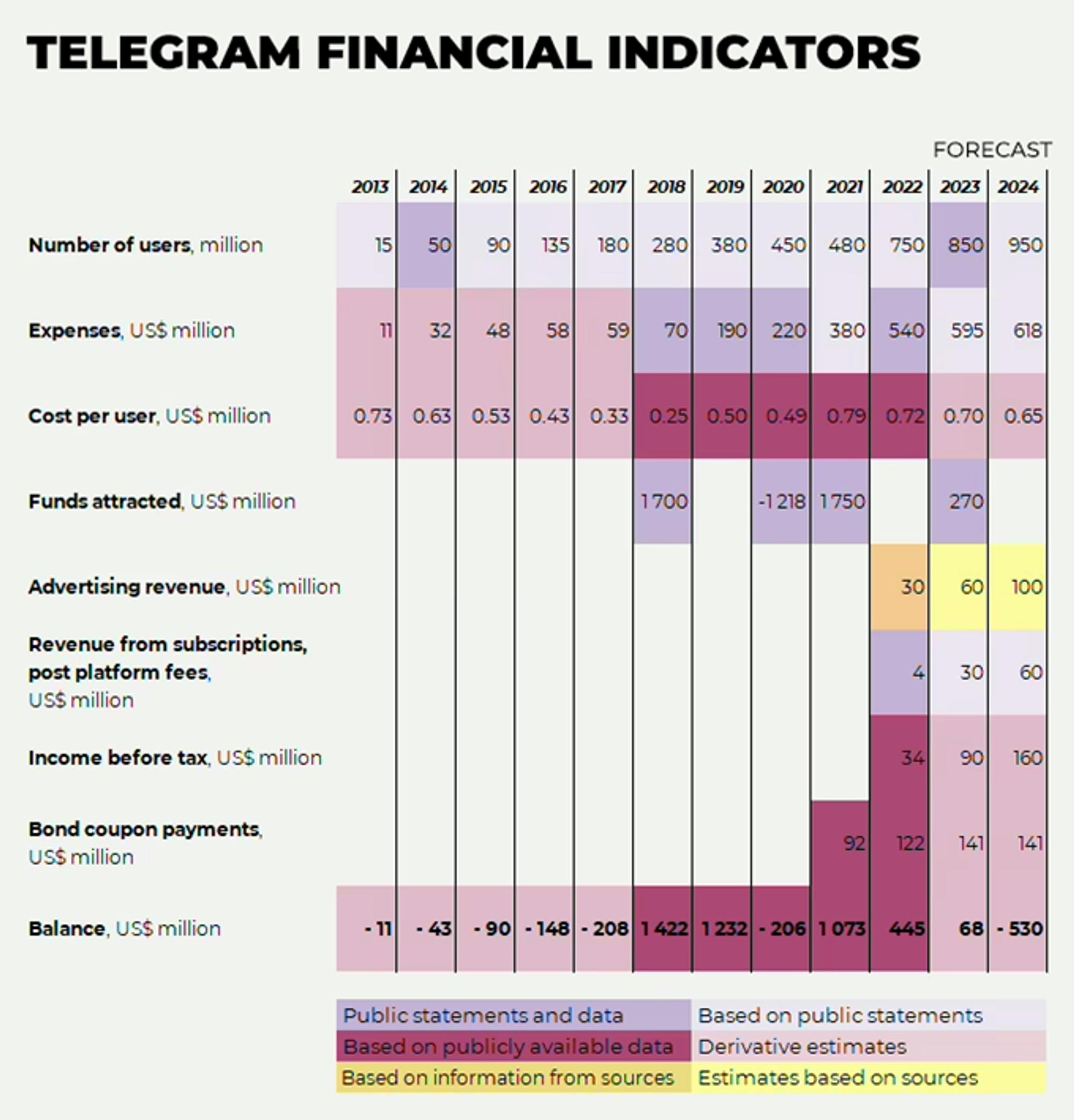
Source: Ukrainska Pravda
Traction
As of September 2025, Telegram’s user base has been growing at a rate of more than 40% each year since its launch in 2013. By the end of 2023, the app had 1 billion total downloads, making it the seventh most downloaded non-gaming app on Google Play, based on worldwide downloads. According to founder Pavel Durov, Telegram attracts 2.5 million new user signups every day.
As of June 2024, the company said that over 400 million users, representing more than 44% of its total user base, interacted with bots and mini-apps on the platform every month for various purposes, such as buying products, accessing services, and playing games. Broadcast channels on Telegram generated 1 trillion views every month as of February 2024.
By April 2025, Telegram ranked among the world’s top five most-downloaded apps, behind TikTok, Instagram, Facebook, and WhatsApp. Founder Pavel Durov reported in March 2025 that the platform had passed one billion monthly active users, up from 950 million monthly active users in mid-2024. Total downloads exceeded 2 billion in early 2025. Premium subscriptions grew rapidly in 2025, reaching 15 million in August 2025, compared with 4 million a month earlier.
Telegram became profitable in 2024, tripling year-over-year to generate over $1 billion in revenue and more than $500 million in profit (excluding crypto assets), reversing a $173 million loss in 2023. Durov also disclosed in December 2024 that Telegram had begun reducing its debt load. The company had raised roughly $2 billion through debt issuance over the prior four years, and repurchased a substantial portion of those bonds in the fall of 2024.
Telegram has also benefited from competitors facing backlash from changes in privacy policies. As previously mentioned, in January 2021, when WhatsApp updated its privacy policy, many users moved to Telegram. During this period, Telegram briefly became the second most downloaded app in the US; Durov announced that the app saw 25 million new users within 72 hours. The surge in popularity of Telegram and other privacy-focused messaging apps was part of a larger trend. In the first half of 2020, apps offering features like end-to-end encryption and self-destructing messages had, on average, 30% more active users than their competitors.
Since the 2022 Russian invasion of Ukraine, Telegram experienced a significant increase in users and activity, becoming a crucial platform for communication and information sharing. Both the Ukrainian and Russian governments have relied heavily on Telegram to disseminate information and rally support, with Ukrainian President Zelensky's channel growing from 65K followers in February 2022 prior to the invasion to over 1.5 million within just three weeks.
Ukrainian cities and officials have also established Telegram channels to share critical information, while civilians can report troop movements through Telegram bots. On the Russian side, the invasion and media crackdown have driven millions of users to Telegram, with Russian-language news channels seeing a 48% or 8 million subscriber increase since February 2024. As of 2023, the year after the invasion, Russians comprised Telegram’s second-largest user base.
However, Telegram has also been used by the Russian military itself, with geopolitical analysts like Peter Zeihan claiming on the day of Pavel Durov’s arrest in August 2024 that “the Russian military uses Telegram nearly exclusively because it is more secure than formal government encryption.” It has also been reported as “the primary vehicle for pro-war military bloggers and media.”
Telegram’s $1.7 billion convertible bond issuance in May 2025, offering investors a 9% yield and discounted IPO access, was heavily oversubscribed and signals growing anticipation of a public listing as early as 2026. In March 2024, Durov had expressed interest in potentially selling part of Telegram's stock to loyal users, similar to Reddit's approach.
Valuation
In March 2024, Pavel Durov, the founder and CEO of Telegram, stated that global investors had offered to invest in the company at a valuation of more than $30 billion. As of September 2025, Telegram had raised a total of $3.2 billion in funding across five rounds. The company raised $330 million through debt financing in March 2024, on top of earlier debt rounds totaling $1.2 billion. The bonds issued in this round had a yield of 7.7% and a maturity date of either 2026 or when Telegram goes public, whichever comes first. The bonds were priced at $91, up from $78 in the previous issue.
Telegram has disclosed some of its investors, which include Mubadala, Manta Ray Ventures, ARK FUND, Dalma Capital, Oyster Ventures, and Abu Dhabi Catalyst Partners, in addition to CEO Pavel Durov himself. However, the majority of the investors hav been sourced privately and remain undisclosed.
Telegram’s estimated 30cx revenue multiple (based on a $30 billion valuation and $1 billion in estimated revenue) is exceptionally high compared to similar publicly traded messaging and social media companies. For reference, Meta Platforms (META), which owns Facebook Messenger and WhatsApp, trades at around 10.6×; Tencent (TCEHY), the operator of WeChat, at 7.3×; and Snap Inc. (SNAP), which runs Snapchat, at 2.4×. Even considering Telegram’s high growth and profitability, its multiple is roughly three times Meta’s, four times Tencent’s, and over twelve times Snap’s, indicating that investors are pricing in substantial future growth and monetization potential.
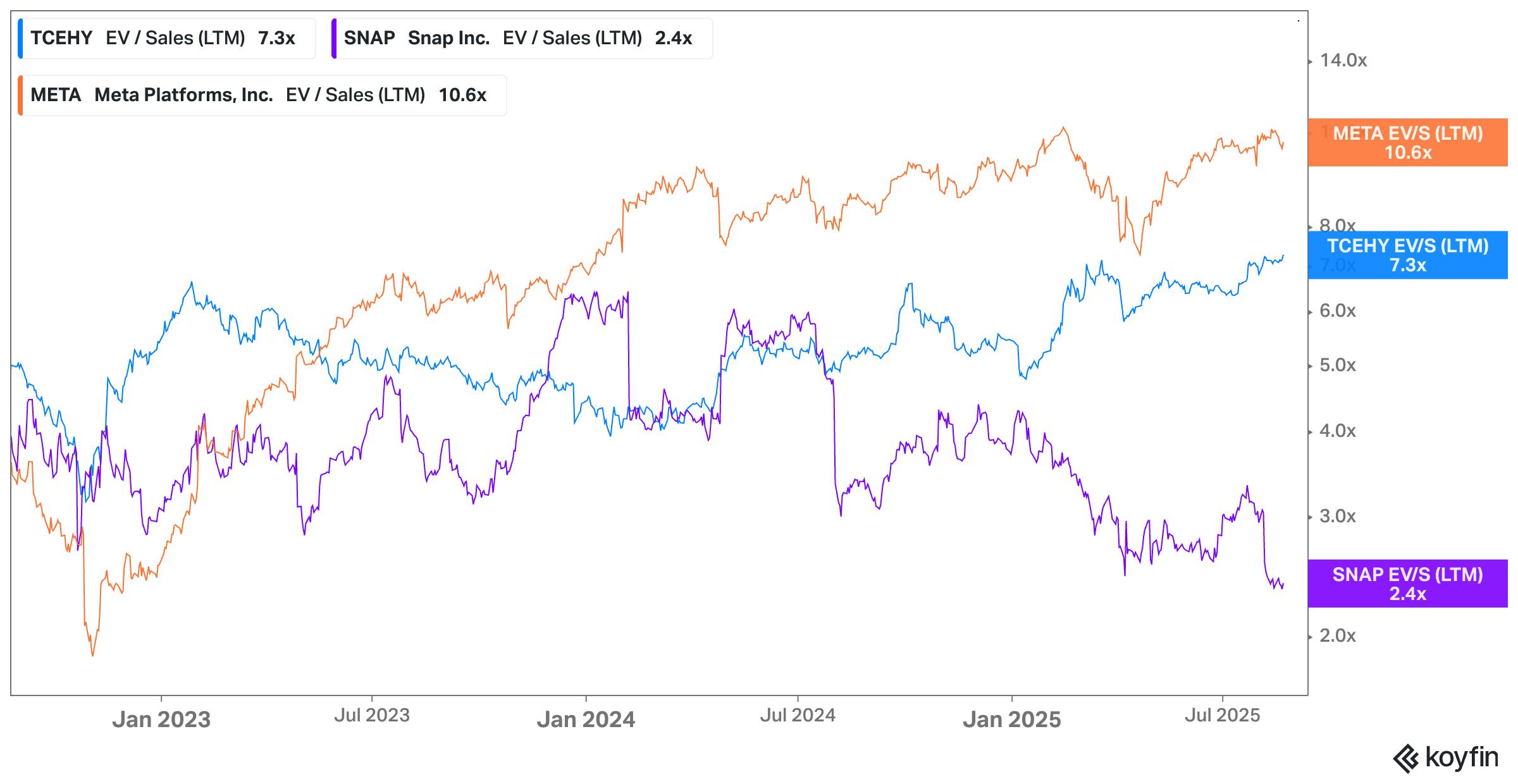
Source: Koyfin
Key Opportunities
Cryptocurrency and Blockchain Integration
Telegram's potential in crypto integration remains significant despite SEC setbacks in 2020. By positioning itself as a facilitator of mainstream crypto adoption, Telegram could become a major player in digital payments, especially in countries with unstable currencies or limited banking access. Telegram’s crypto wallet, allowing developers to create crypto-compatible mini apps, exemplifies Telegram's embrace of decentralized payments, which could end up attracting millions of new users from unbanked populations in developing countries.
In January 2025, Telegram and the TON Foundation entered an exclusive partnership: TON became the sole blockchain infrastructure powering Telegram’s Mini Apps ecosystem, with Toncoin as the only cryptocurrency accepted for non-fiat payments (including for Stars, Premium, ads, and developer payouts). As of September 2025, the TON Connect protocol remains a mandatory integration element of all blockchain Mini Apps.
Between January and February, the TON ecosystem added over 3.1 million new wallets, reached $500–$700 million in monthly trading volume, and recorded 20–30 million weekly transactions, placing TON among the top eight blockchains by activity. In March, institutional confidence increased, with major venture capital firms holding over $400 million in Toncoin.
In July 2025, a Telegram Gifts drop by Snoop Dogg generated $12 million in sales within 37 minutes, driving significant growth in Stars usage. Trading volumes rose, transaction speeds improved by a factor of 10, the ecosystem expanded into music and gaming integrations, and TON was ranked as one of the top three NFT blockchains globally.
AI-Powered Content Moderation
One of Telegram's greatest challenges has been balancing its commitment to free speech and individual privacy with the need for effective content moderation at scale. The platform has faced criticism for being used by terrorist organizations and other bad actors to spread extremist content and misinformation. To address this issue, Telegram is exploring the implementation of advanced AI moderation tools to improve harmful content detection and removal while maintaining user privacy. In late 2024, the company used advanced AI tools to remove over 15 million groups and channels linked to harmful content, including fraud and terrorism. This approach could lead to more nuanced content policies, enhancing Telegram's reputation for safety and attracting users and enterprises prioritizing platform security.
Evolving into a Super App
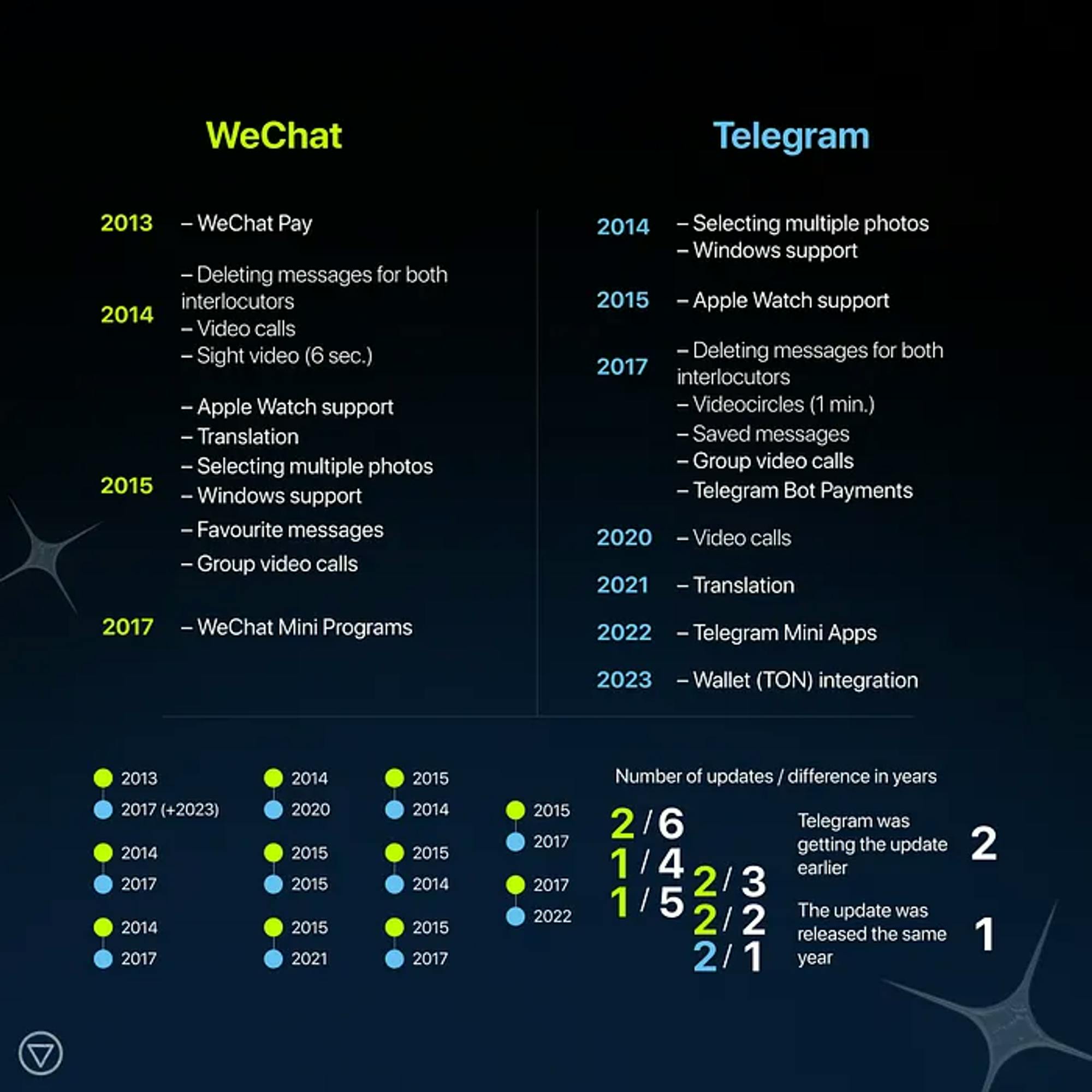
Source: TON Society
Telegram has been steadily adding features to evolve into a WeChat-like super app, offering a wide range of services beyond messaging. The platform already supports a growing list of third-party mini apps, such as TON Space, which run inside Telegram and enable users to access various features and services without leaving the app.
In 2024, Telegram released its largest update ever for Mini Apps, introducing full-screen support (portrait and landscape), home screen shortcuts, geolocation access, device-motion tracking, media sharing, document creation, and subscription monetization via Telegram Stars. These capabilities moved Mini Apps closer to standalone apps, making them more immersive and functional. Over 75,000 apps were active as of the first quarter of 2025, a 200% increase from 2024.
Key Risks
Content Moderation
Telegram has faced criticism for its light platform moderation, which has been used by extremist organizations, criminal groups, and terrorist organizations. These actors can exploit Telegram to disseminate news within the cybercriminal community, highlight vulnerabilities in organizations' cyber defenses, buy and sell leaked corporate data, conduct auctions for high-value information, and distribute malware using Telegram bots.
The company's approach to content moderation and platform governance has been scrutinized, with Telegram lacking a clear definition of illegal content. On its FAQ page, Telegram explains that because all Telegram chats are private amongst participants, the company can't process any illegal content requests related to them.
Critics argue that Telegram's reliance on technology, such as encryption or AI in the future, is insufficient for governing user behavior and that the platform's decision-making process appears ad hoc and inconsistent. Telegram has also been accused of being slow to respond to verification requests or restricting channels without removing the content of the channels themselves. A November 2023 WIRED investigation, for example, revealed that Hamas content was still active in unrestricted channels.
User reviews highlight concerns about Telegram's lack of policies to block inappropriate content, such as channels and chats that encourage violence against women, as well as the need for better tools to prevent malicious bots from spamming users. Some users have expressed frustration with the platform's user experience and support, suggesting that Telegram does not prioritize its users' needs.
Telegram CEO Pavel Durov’s arrest and subsequent indictment in France in August 2024 were related to the alleged failure of Telegram to moderate content on its platform, potentially running afoul of EU regulations making companies liable for illegal activities that are not moderated. Although Telegram denied that it was in breach of such regulations on the day of the arrest, the French investigation is ongoing, and its result is yet to be determined.
A late-2024 study by the Southern Poverty Law Center, covered by the BBC, revealed that Telegram’s algorithmic recommendations frequently push users toward far-right extremist content, even during seemingly innocuous searches. Scam operations surged on Telegram in 2025, particularly in cryptocurrency, doxxing, blackmail, and extortion, prompting Durov to pledge sweeping channel bans in response. Meanwhile, geopolitical tensions affected platform access: Nepal banned Telegram in July 2025 over fraud and money laundering concerns, and Vietnam began ordering telecom operators to block the app, citing that a majority of local channels were malicious.
As Telegram continues to grow, the company will need to address these content moderation and governance challenges to maintain user trust and avoid further regulatory backlash, which now includes the imprisonment of its CEO. Failure to do so could hinder the platform's expansion and damage its reputation, while also subjecting the company to further legal action or even criminal prosecution that may severely impact its ability to do business.
Geopolitical Factors
Telegram's global presence and encryption features have led to bans or restrictions in several countries, including China, Iran, and Iraq. This highlights the challenges of operating a global messaging platform in diverse regulatory environments.
The platform's use for organizing protests and disseminating information in various countries has made it a target for government scrutiny. As Telegram deepens its involvement with cryptocurrency through the integration of the TON blockchain, it may face increased attention from financial regulators given the varying cryptocurrency regulations across countries.
In addition, Telegram’s heavy use by the Russian military for secure communications puts it at the center of geopolitical tensions that could introduce numerous risks and challenges based on the evolving geopolitical landscape in Europe and internationally.
The arrest of Pavel Durov itself has already had geopolitical consequences. The United Arab Emirates, where Telegram is based, suspended a deal with France to purchase 80 warplanes after the UAE government submitted a formal request to France to provide Durov access to consular services in the aftermath of his arrest. Durov holds citizenship in the UAE, France, and Russia.
These factors involve Telegram in the politics within and between large and powerful nation-states, posing a uniquely potent risk not only to its business but to the safety and freedom of its employees. It must carefully navigate that risk and seek to reduce its exposure to geopolitical volatility, which has seen major escalations in the early 2020s and is approaching new heights in the post-Cold War period.
Rising and Existing Competitors
Despite Telegram's growing user base, major tech companies like Meta (WhatsApp) and Apple (iMessage) continue to dominate the messaging space in many markets. The strong network effect in this market makes it challenging for users to switch platforms, even if they prefer Telegram's features.
These competitors have significant resources to invest in new features and marketing. Additionally, despite CEO Pavel Durov's accusations against Signal, its default end-to-end encryption and other features may position it as a more secure option than Telegram.
Beyond traditional rivals, emerging messaging platforms present new competitive threats. In Russia, the government-backed MAX app is being pre-installed on all new smartphones and tablets starting September 2025, and includes integrated governmental services. On another front, Jack Dorsey’s Bitchat, a peer-to-peer encrypted messaging app working offline over Bluetooth, targets use cases where internet access is unreliable or censored. Although still in beta as of August 2025, it represents a conceptual competitor in secure, resilient messaging.
Summary
Telegram has established itself as a major player in the global messaging market, surpassing one billion monthly active users as of March 2025 and achieving an estimated valuation of over $30 billion. This growth is driven by its privacy features, large group chat capabilities, and a feature-rich platform. The company became profitable in late 2024, with over $1 billion in revenue, fueled by premium subscriptions, advertising, and in-app monetization features like Telegram Stars. An IPO is under consideration to ensure independence and democratize access to Telegram's value.
Key opportunities for Telegram include evolving into a “super app” through cryptocurrency integration and mini-app development, alongside implementing AI-powered content moderation to address safety concerns. However, the platform faces significant challenges in content moderation and governance. Criticism over extremist content, scams, and algorithmic recommendations toward harmful material has intensified, compounded by the arrest and ongoing investigation of CEO Pavel Durov in France. Regulatory scrutiny and country-level bans, such as in Nepal and partial restrictions in Vietnam, highlight the ongoing tension between user privacy, platform growth, and compliance requirements. Telegram must continue refining its policies and technology to maintain trust, ensure compliance, and protect its reputation while scaling globally.
